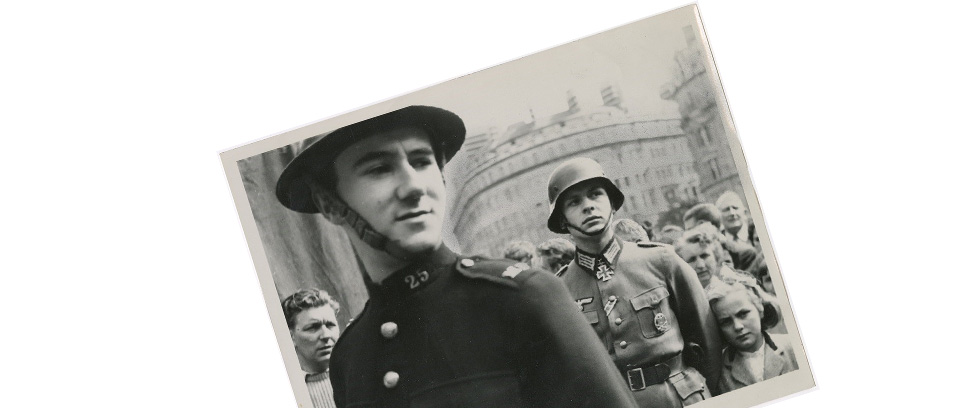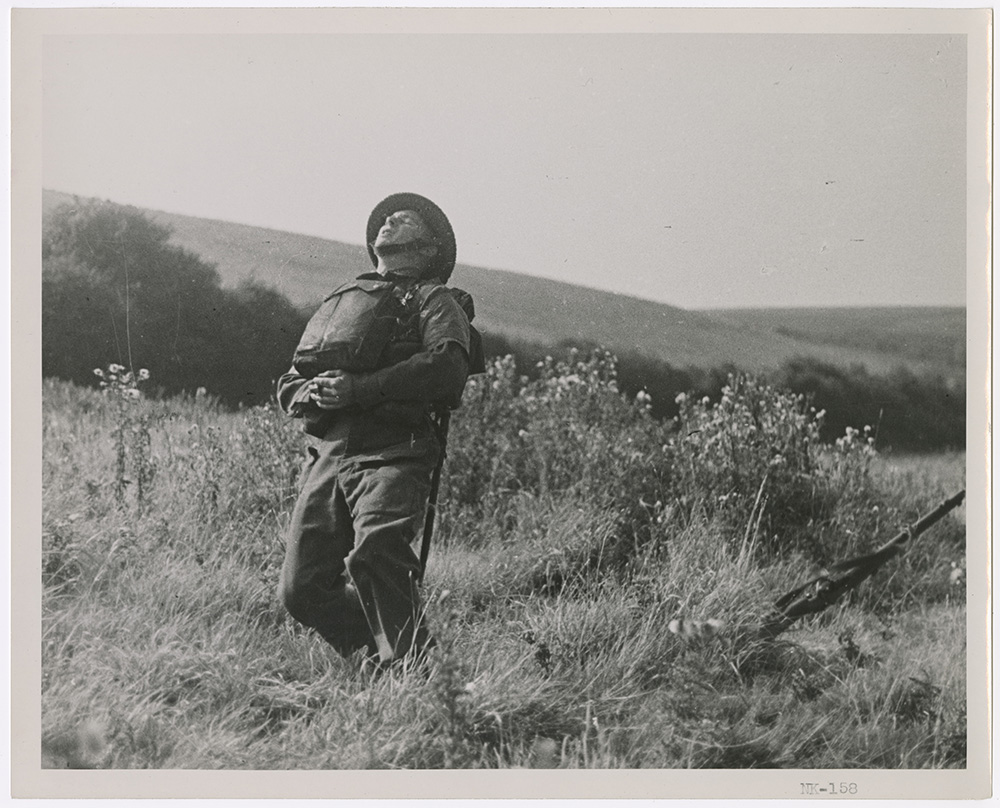
They Came in Khaki – National Socialists on English soil in British cinema
Mathias Barkhaus | 6. Januar 2023
A victory in the aerial Battle of Britain in 1940 was supposed to set the parameters for Nazi Germany’s invasion of Great Britain. Even though we know today that the attempt failed, film history shows us that it could have ended differently. Two examples in particular underscore this point: Alberto Cavalcanti’s “Went the Day Well?” from 1942 depicts a possible Nazi invasion of Britain, while in the 1964 feature film “It Happened Here”, the invasion has already succeeded. The two films proceed from completely different notions about the islanders’ behavioural patterns, as Mathias Barkhausen, DHM trainee in the area of cinema and Zeughauskino, describes in this article.
Operation Sea Lion – this was the name the Nazis gave their plan to carry out the first successful conquest of Britain since 1066. The British authorities tried to alleviate the population’s fear by producing propaganda films that appealed to their solidarity and told them to keep a watchful eye. To this effect, filmmakers Humphrey Jennings and Harry Watt titled their short film: “London Can Take It!”
Although the Blitz, the aerial attacks on London and strategic targets, had already ceased by 1942, the fear of invasion, as film historians Anthony Aldgate and Jeffrey Richards state in “Britain Can Take It”, had by no means disappeared given the fall of Singapore and patrol of three German warships in the English Channel. Alberto Cavalcanti, till then known primarily as documentary filmmaker, was hired to film “Went the Day Well?” for Ealing Studios, which for their part had depended mostly on comedies for their success.
The premise of the film, which foresees a futuristic scenario that never comes about, is quickly told: Sixty German paratroopers land in the fictional village of Bramley End. At first undetected, they pretend to be English soldiers, but then round up the local villagers and hold them captive in the village church while they prepare the invasion by destroying the telecommunications system. In this scenario the British inhabitants are above all resilient – even an older lady turns into a sprightly resistance fighter who is not afraid to throw pepper in the face of a German with a mouthful of bratwurst, and then kill him with a hatchet. The advantage she has gained through this act is immediately erased by the gossiping telephone girls who fail to put through her call, thus giving the contemporary audience a new meaning to the British government’s propaganda slogan: “Careless talk costs lives.”
In other words, it is also important to protect the lives of the rural population. With the practised eye of the documentarist, Cavalcanti presents a broad view of life in the countryside without becoming sentimental: he describes such minor social interactions in the village as walking to church or to the pub, thus showing what is at stake.
In Cavalcanti’s film, the British are good-natured, simple folk, who can hardly imagine that the guests are not Englishmen, but rather German soldiers or possibly collaborators from their own ranks – until some women from the village get wise to the false identity of the intruders through a combination of intelligence and good fortune.
In this way, “Went the Day Well?” is a warning not to ignore the threat stemming from members of the “fifth column”, represented in the treacherous figure played by Leslie Banks. Some twenty years later, the topic of the sympathy that some members of British society felt for National Socialism is again taken up in the film “It Happened Here”, a sympathy that could quickly turn into collaboration.

Operation Sea Lion – this was the name the Nazis gave their plan to carry out the first successful conquest of Britain since 1066. The British authorities tried to alleviate the population’s fear by producing propaganda films that appealed to their solidarity and told them to keep a watchful eye. To this effect, filmmakers Humphrey Jennings and Harry Watt titled their short film: “London Can Take It!”
Although the Blitz, the aerial attacks on London and strategic targets, had already ceased by 1942, the fear of invasion, as film historians Anthony Aldgate and Jeffrey Richards state in “Britain Can Take It”, had by no means disappeared given the fall of Singapore and patrol of three German warships in the English Channel. Alberto Cavalcanti, till then known primarily as documentary filmmaker, was hired to film “Went the Day Well?” for Ealing Studios, which for their part had depended mostly on comedies for their success. The premise of the film, which foresees a futuristic scenario that never comes about, is quickly told: Sixty German paratroopers land in the fictional village of Bramley End. At first undetected, they
pretend to be English soldiers, but then round up the local villagers and hold them captive in the village church while they prepare the invasion by destroying the telecommunications system. In this scenario the British inhabitants are above all resilient – even an older lady turns into a sprightly resistance fighter who is not afraid to throw pepper in the face of a German with a mouthful of bratwurst, and then kill him with a hatchet. The advantage she has gained through this act is immediately erased by the gossiping telephone girls who fail to put through her call, thus giving the contemporary audience a new meaning to the British government’s propaganda slogan: “Careless talk costs lives.”
In other words, it is also important to protect the lives of the rural population. With the practised eye of the documentarist, Cavalcanti presents a broad view of life in the countryside without becoming sentimental: he describes such minor social interactions in the village as walking to church or to the pub, thus showing what is at stake.
In Cavalcanti’s film, the British are good-natured, simple folk, who can hardly imagine that the guests are not Englishmen, but rather German soldiers or possibly collaborators from their own ranks – until some women from the village get wise to the false identity of the intruders through a combination of intelligence and good fortune.
In this way, “Went the Day Well?” is a warning not to ignore the threat stemming from members of the “fifth column”, represented in the treacherous figure played by Leslie Banks. Some twenty years later, the topic of the sympathy that some members of British society felt for National Socialism is again taken up in the film “It Happened Here”, a sympathy that could quickly turn into collaboration.

“Keep calm and carry on”: With this slogan from 1939, the British government appealed to the population for perseverance in face of the war. But the slogan also seems to refer to what many of the characters in “It Happened Here” are opportunistically thinking when they find themselves in a fascist England after the conquest of the United Kingdom by the Nazis.
One of them is Pauline, an Irish nurse who more out of an instinct for survival than ideological conviction joins the Immediate Action Organisation, a paramilitary medical corps, and unwittingly gets involved in a euthanasia programme, whose feigned aims she begins to question after encountering an old schoolmate, now a resistance fighter. She gradually grows into her historical and individual responsibility.
Andrew Mollo and Kevin Brownlow’s directorial debut, whose eight-year production history would deserve a blog of its own, met with mixed reactions when it was released. After all, it presents an alternative vision of history that challenges the image that Britons had of themselves. The greatest irritation was found in seven minutes of the film that were deleted after its release. In these scenes, which were spontaneously improvised, members of the Union of British Fascists take the stage to spread their dehumanising ideology. In his book “How It Happened Here”, Brownlow defended the decision to film the scenes, as follows:
No film since the end of the war had given National Socialists carte blanche to express their opinions with the result that few people had a clear idea of what they stood for, or of the insidious threat they represented.
“It Happened Here” explores fascism as a phenomenon of the masses and less as the result of gifted rhetoricians and ideologists. And the film itself is not free from a fascist aesthetic, as film critic David Robinson remarked:
In a way, the filmmakers themselves are seduced. They communicate their own delight in the uniforms and military show, in the spectacle of an admirably staged Nazi torchlight funeral. […] This admirably achieved, admirably intentioned film could be hot stuff for an audience with the wrong preconditioning.
This is precisely the starting point of “It Happened Here”, for like “Went the Day Well?”, it shines a light on the Nazi sympathies of some Britons. While the latter film formulates its observations in the present time, the former work seeks answers to today’s questions in the past.
The Zeughauskino is showing both films within the framework of the series “Roads not Taken. Alternative historical narratives in film”. The series presents feature films that explore alternative courses of history and take up questions examined in the eponymous exhibition in the Pei Building.
[1] For a long time “They Came in Khaki” was the working title of Cavalcanti’s film, but in the end the producers decided to use an epitaph written by John Maxwell Edmonds: “Went the day well? // We died and never knew. // But, well or ill, // Freedom, we died for you.”
Filmographie:
Went the Day Well? (GB 1942, Alberto Cavalcanti)
It Happened Here (GB 1964, Kevin Brownlow, Andrew Mollo)
Bibliographie:
Aldgate, Anthony / Richards, Jeffrey (1986): Britain Can Take It. The British Cinema in the Second World War. Oxford: Blackwell.
Brownlow, Kevin (1968): How It Happened Here. London: Secker & Warburg.
Ford, Lynsey (2018): How We made It Happened Here, the film that imagined England under the Nazis. British Film Institute. Online aufrufbar unter: https://www.bfi.org.uk/interviews/it-happened-here-kevin-brownlow.
Fuller, Graham (2011): Why We Fight. Ealing Studios’ Wartime what-if. In: Film Comment 47, 3, S.24-25.
Robinson, David (1968): Introduction. In: Brownlow, Kevin (Hrsg.): How It Happened Here. London: Secker & Warburg.
Tibbetts, John C. (2000): Kevin Brownlow’s Historical Films: It Happened Here (1965) and Winstanley (1975). In: Historical Journal of Film, Radio and Television 20, 2, S.227-251.
|
Foto: privat |
Mathias BarkhausenMathias Barkhausen is a research volunteer in the Department of Cinematheque & Zeughauskino of the German Historical Museum since 2021. During and after his studies in Media Studies & German Studies in Bonn and Prague, he worked for various film festivals in Germany, including the Berlinale, Filmfest München and Filmschoolfest Munich, where he was involved in everything from programme coordination and moderation to the selection committee. |
